By Walter Sabo
Consultant, Sabo Media
A.K.A. Walter Sterling
Radio Host, Sterling On Sunday
Talk Media Network
The creeping culture of sales-determines-all has brought the industry to this moment of despair. The selling culture has failed the medium. It is time to, once again, segregate the sales and programming departments. Take the budgets away from the program directors and inspire them to create exciting UNPREDICTABLE programming.
Earnings calls for most radio companies were held this week. Not pretty. Declarations of the demise of radio are constant, emotional, and desperate. Bleak conditions in the radio industry have occurred before. A review of past crises and how they were overcome is constructive, urgent, and essential.
For example, in 1952, network TV was launched and showed signs of success. NBC, ABC, and CBS moved their money from radio to TV. Longform radio shows were cancelled leaving stations across the country with a problem. At the time, most radio stations were small shops, usually family-owned, therefore the need to add hours of local programming was a financial challenge. The solution was presented by a programmer.
Todd Storz’ family owned stations in Omaha, Kansas City, Minneapolis, New Orleans, St Louis and Oklahoma City. He was young and obsessed with radio. His stations were losing money and the future, without network show blocks, was uncertain. Todd ate at a diner daily and noticed that even after it closed, the waitresses put their own money in the jukebox to hear the same songs they had heard all day. Hit after hit. Todd created a list of the top 40 songs, built a production sound and put it on his Omaha station. The station was #1 overnight. His top 40 format was aired on his owned stations with the same results.
Ruth Meyer was the program director of WMCA, New York where she established the GOOD GUYS dynasty. Before WMCA Ruth was the PD of Storz’s station in Kansas City. I asked her who did what at Storz and she said, “It was all Todd.” Todd was a programmer who never spent a day in sales. Storz’s programming idea changed and, yes, saved the industry.
When Todd died at 38 years of age his father – a businessman – took over the company. After Todd’s death, the stations died too. Why? Storz station manager Deane Johnson explained, “Todd’s death [and the control of the radio stations falling to Todd’s father] brought about a shift from a ‘programming company’ to a ‘money company.’”
Radio’s next challenge was FM. It is a popular myth that the shift from AM listening to FM was driven by the higher quality of the FM signal. FM’s signal had been available since 1948. No one listened.
You don’t go to iMAX to watch the huge, superior white screen. You go to watch a movie on the huge superior white screen. When the FCC mandated an end to AM/FM simulcasts, the general managers had no idea what to do and isn’t it time for golf?
Obsessed, very young radio fanboy programmers such as Michael Harrison and Allen Shaw joined with frustrated senior programmers like B. Mitchel Reed, Scott Muni, Murray the K and Tom Donahue to EXPERIMENT with new programming techniques. They imagined and implemented progressive rock, free-form, album rock. THEN the crowds came to FM to hear exciting UNPREDICTABLE programming.
In 1966, Tom O’Neil, the founder/chairman of RKO General owned many money-losing, major market stations. The solution? Better sellers? Better sales training? A sales master course? No. The answer was Bill Drake. O’Neil hired Bill Drake and allowed him to create exciting UNPREDICABLE programming. Drake’s programming saved many RKO stations and was copied by hundreds of stations across the country. Drake’s programming saved them, too.
ALL of radio’s challenges today can be solved with programming invented by programmers free to program. Enough with “it’s not in the budget.” Enough with “it will bring in money.” Enough with “it’s good for sales.” Enough with talent having to generate half their salary in billing to be retained. Enough!
Unleash today’s program directors to follow their instincts, their facts and no more having to check with corporate. Why? Because checking with corporate hasn’t worked. Checking with corporate stops the flow of ideas, it freezes them in time. Radio is live, in the moment. When radio programming is frozen in time it MUST fail. Give up corporate engagement. Let programmers surprise you.
To quote a mentor, ABC Radio Network’s VP Dick McCauley (a sales guy), “A great salesperson is one who has a great product.” He said it a lot.
Walter Sabo was the youngest executive vice president in the history of NBC. He was the programming consultant to RKO General longer than Bill Drake. According to a Sirius corporate EVP, “Sirius exists because of what Walter Sabo did.” He hosts a Talk Media Network radio show as Walter M. Sterling, “Sterling on Sunday.” Find out more here: www.waltersterlingshow.com Contact him at walter@sabomedia.com or 646.678.1110
Share this with your network
 Mentioning a local street name won’t do it. Constant local references is not LOCAL LIVE, it’s a GOOGLE MAP!
Mentioning a local street name won’t do it. Constant local references is not LOCAL LIVE, it’s a GOOGLE MAP!


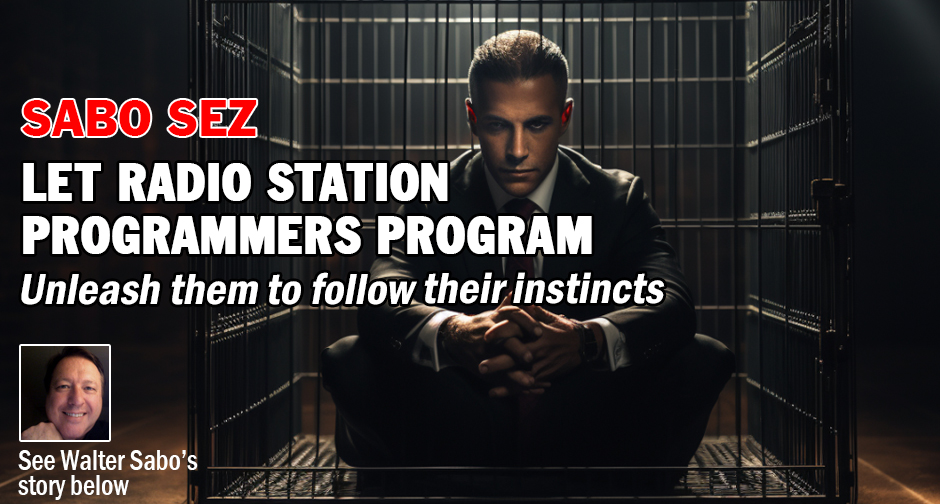
 HALF of all radio stations in the United States lose money – at least they did back in 1991. The NAB used to put out an annual report revealing how many radio stations were profitable. Usually half the stations in America lost money. Since consolidation, the NAB stopped putting out that report. It is reasonable to believe that far, far fewer stations lose money today. Shared costs, real estate, technical economies due to digital equipment versus analog all indicate that there must be fewer money-losing properties.
HALF of all radio stations in the United States lose money – at least they did back in 1991. The NAB used to put out an annual report revealing how many radio stations were profitable. Usually half the stations in America lost money. Since consolidation, the NAB stopped putting out that report. It is reasonable to believe that far, far fewer stations lose money today. Shared costs, real estate, technical economies due to digital equipment versus analog all indicate that there must be fewer money-losing properties. Amazing fact: In ancient times, from 1962-1972, the highest-paid on-air talent in New York City was “an overnight guy.” He was paid salary plus sales response. I’m talking about Long John Nebel on WOR, WNBC, then WMCA. Long John’s live reads moved product because his audience was captive. One-to-one his listeners were attached to their radios in the truck cab, night watchman’s building lobby, parents pacing with their babies, students cramming. His background was not in radio; he was a skilled auctioneer. Obviously, the same listeners exist today – and are anxious for someone to talk to them. Check out this old clip of Nebel in action:
Amazing fact: In ancient times, from 1962-1972, the highest-paid on-air talent in New York City was “an overnight guy.” He was paid salary plus sales response. I’m talking about Long John Nebel on WOR, WNBC, then WMCA. Long John’s live reads moved product because his audience was captive. One-to-one his listeners were attached to their radios in the truck cab, night watchman’s building lobby, parents pacing with their babies, students cramming. His background was not in radio; he was a skilled auctioneer. Obviously, the same listeners exist today – and are anxious for someone to talk to them. Check out this old clip of Nebel in action: 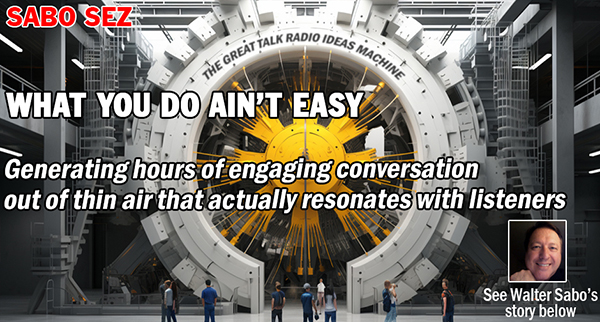

 In the early 1980s, talk radio made a $4 billion mistake. Prior to then, there were approximately 50 full-time talk stations in America. They were predominantly found in major markets and had been in the format since Marconi. The original talk stations had two key traits: They were dominant in ratings and much of their popularity was driven by women hosts.
In the early 1980s, talk radio made a $4 billion mistake. Prior to then, there were approximately 50 full-time talk stations in America. They were predominantly found in major markets and had been in the format since Marconi. The original talk stations had two key traits: They were dominant in ratings and much of their popularity was driven by women hosts.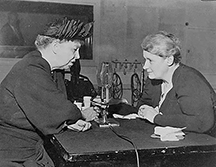 Then Mary Margaret read live copy. OR Mary Margaret had her guests read live copy. Sales for advertisers exploded. (Source: It’s One O’ Clock, Time for Mary Margaret McBride by Susan Ware
Then Mary Margaret read live copy. OR Mary Margaret had her guests read live copy. Sales for advertisers exploded. (Source: It’s One O’ Clock, Time for Mary Margaret McBride by Susan Ware  Last week I had the privilege of moderating a panel at the TALKERS conference. Confession: I listen to speech patterns and tones more than words.
Last week I had the privilege of moderating a panel at the TALKERS conference. Confession: I listen to speech patterns and tones more than words.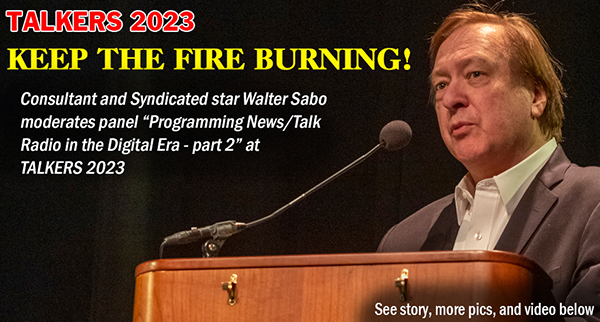
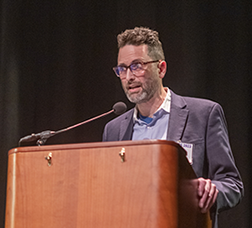 News/Talk Radio in the Digital Era – Part 2.” The session, sponsored by “Our American Stories,” is introduced by Alex Fife, VP operations, Southeast, iHeartMedia – Total Traffic & Weather Network (pictured at right) and moderated by Walter Sabo, CEO, Sabo Media and host (Walter Sterling) of Sterling on Sunday (pictured above). Panelists (pictured below from left to right) include Dan Mandis, program director and host, WTN-FM, Nashville; Ross Kaminsky, host KOA, Denver; Phil Boyce, SVP, spoken word format, Salem Media Group/ops VP, New York region/WMCA/AM 970; Josh Leng, CEO, Talk Media Network; and Matt Meany, program director, WABC, New York/Red Apple Media.
News/Talk Radio in the Digital Era – Part 2.” The session, sponsored by “Our American Stories,” is introduced by Alex Fife, VP operations, Southeast, iHeartMedia – Total Traffic & Weather Network (pictured at right) and moderated by Walter Sabo, CEO, Sabo Media and host (Walter Sterling) of Sterling on Sunday (pictured above). Panelists (pictured below from left to right) include Dan Mandis, program director and host, WTN-FM, Nashville; Ross Kaminsky, host KOA, Denver; Phil Boyce, SVP, spoken word format, Salem Media Group/ops VP, New York region/WMCA/AM 970; Josh Leng, CEO, Talk Media Network; and Matt Meany, program director, WABC, New York/Red Apple Media. 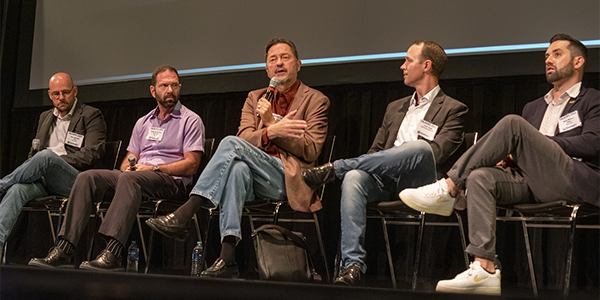
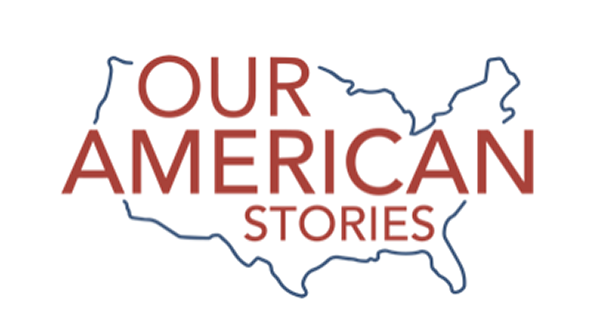
 Michael Harrison, founder and publisher of TALKERS, and the man who invented the term AOR – let’s not forget – strongly requested that I share this story about a remarkable event we experienced. Michael describes it as the “greatest promotion” he ever witnessed at a non-commercial function involving broadcasters… so I really have no choice but to accommodate him.
Michael Harrison, founder and publisher of TALKERS, and the man who invented the term AOR – let’s not forget – strongly requested that I share this story about a remarkable event we experienced. Michael describes it as the “greatest promotion” he ever witnessed at a non-commercial function involving broadcasters… so I really have no choice but to accommodate him.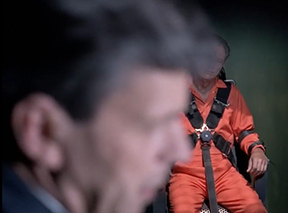 biography. I wrote him a letter inviting him to fly to New York to perform the scene live at our anniversary lunch at the National Arts Club. Two appealing prospects: Manhattan and the famous Club on Gramercy Park. Shockingly, he actually called and said if I would also fly his girlfriend in, he would do it! HE WOULD DO IT. Crap, now I had to do everything else. Invite all 200 wedding guests, stage a show, and not tell anyone that it was going to happen. Katie did not know.
biography. I wrote him a letter inviting him to fly to New York to perform the scene live at our anniversary lunch at the National Arts Club. Two appealing prospects: Manhattan and the famous Club on Gramercy Park. Shockingly, he actually called and said if I would also fly his girlfriend in, he would do it! HE WOULD DO IT. Crap, now I had to do everything else. Invite all 200 wedding guests, stage a show, and not tell anyone that it was going to happen. Katie did not know. A beautiful night. Paul Galvin and William Lear took their girlfriends to a romantic look-out view. Paul asked, “Isn’t this great?” His girlfriend replied, “It would better if we could hear music.”
A beautiful night. Paul Galvin and William Lear took their girlfriends to a romantic look-out view. Paul asked, “Isn’t this great?” His girlfriend replied, “It would better if we could hear music.” The whining is non-stop. Many in radio mourn the advent of consolidation, corporate dictates, staff cuts. They miss the way the industry was – before.
The whining is non-stop. Many in radio mourn the advent of consolidation, corporate dictates, staff cuts. They miss the way the industry was – before.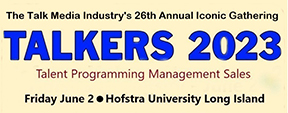 Grace Blazer, VP, national NTS brand coordinator, director of news and AM programming Florida region, iHeartMedia; Kevin Delany, VP, news & talk programming, Westwood One; Matt Meany, program director, WABC, New York; Eric Stanger, VP, operations, “The Sean Hannity Show,” Premiere Networks; and Joe Thomas, talk show host/program director, WCHV, Charlottesville, VA.
Grace Blazer, VP, national NTS brand coordinator, director of news and AM programming Florida region, iHeartMedia; Kevin Delany, VP, news & talk programming, Westwood One; Matt Meany, program director, WABC, New York; Eric Stanger, VP, operations, “The Sean Hannity Show,” Premiere Networks; and Joe Thomas, talk show host/program director, WCHV, Charlottesville, VA. A shocking number of highly qualified broadcasters have lost their jobs. The venture capitalists that financed the big radio companies are the people who should be fired, but that’s the next column. Let’s get you a job.
A shocking number of highly qualified broadcasters have lost their jobs. The venture capitalists that financed the big radio companies are the people who should be fired, but that’s the next column. Let’s get you a job. It was a cruel trick. Hulu started streaming “For the People” from Shondaland Productions last month and I bit. It is a show about Manhattan, ambition and really well-tailored clothes. Then I looked at the more information tab and discovered that the show was cancelled… in 2018. Crushed. Two seasons on ABC. Cancelled.
It was a cruel trick. Hulu started streaming “For the People” from Shondaland Productions last month and I bit. It is a show about Manhattan, ambition and really well-tailored clothes. Then I looked at the more information tab and discovered that the show was cancelled… in 2018. Crushed. Two seasons on ABC. Cancelled. Oh, excuse me, hold on. Here it is! The hourly report from quasi research companies or real research companies like Nielsen declaring that radio is just fine, thank you! Massive surveys (choose one) reveal that radio works! Radio appeals to younger demos! Radio moves product! Radio has more listeners in AM drive than the “Tonight Show” has viewers! A landslide of data proves that after 100 years of success, radio is a viable medium.
Oh, excuse me, hold on. Here it is! The hourly report from quasi research companies or real research companies like Nielsen declaring that radio is just fine, thank you! Massive surveys (choose one) reveal that radio works! Radio appeals to younger demos! Radio moves product! Radio has more listeners in AM drive than the “Tonight Show” has viewers! A landslide of data proves that after 100 years of success, radio is a viable medium. It’s tough enough for radio talent to navigate stable careers in these days of consolidated station ownership, personnel cutbacks and drastic salary reductions – but the NAB’s newly stated stance on non-competes adds insult to injury and is out of step with the interests of beleaguered professionals still hanging on for dear life in the programming sector of this industry. I understand that the National Association of Broadcasters is at heart a lobbying group representing the interests of the medium’s ownership but, c’mon – non-competes really are of another era and egregiously unfair.
It’s tough enough for radio talent to navigate stable careers in these days of consolidated station ownership, personnel cutbacks and drastic salary reductions – but the NAB’s newly stated stance on non-competes adds insult to injury and is out of step with the interests of beleaguered professionals still hanging on for dear life in the programming sector of this industry. I understand that the National Association of Broadcasters is at heart a lobbying group representing the interests of the medium’s ownership but, c’mon – non-competes really are of another era and egregiously unfair.